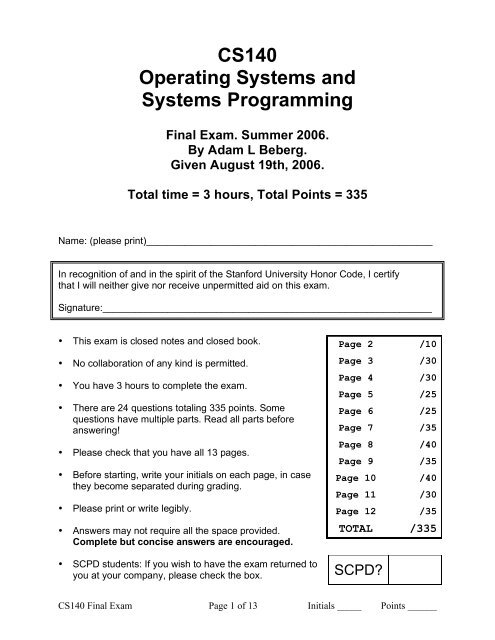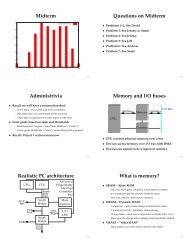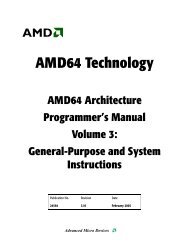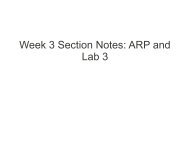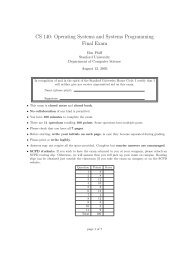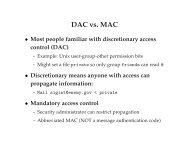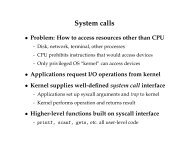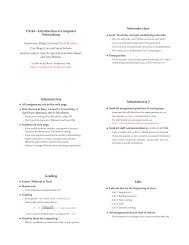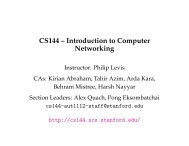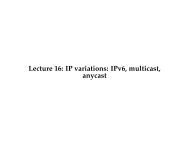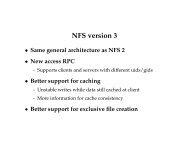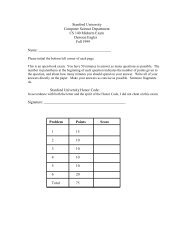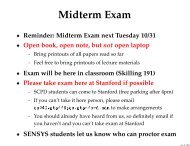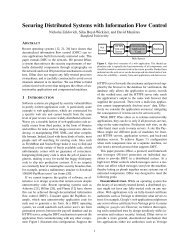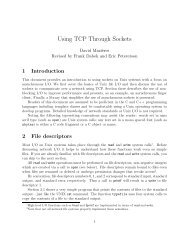CS140 Operating Systems and Systems Programming - Stanford ...
CS140 Operating Systems and Systems Programming - Stanford ...
CS140 Operating Systems and Systems Programming - Stanford ...
Create successful ePaper yourself
Turn your PDF publications into a flip-book with our unique Google optimized e-Paper software.
<strong>CS140</strong><br />
<strong>Operating</strong> <strong>Systems</strong> <strong>and</strong><br />
<strong>Systems</strong> <strong>Programming</strong><br />
Final Exam. Summer 2006.<br />
By Adam L Beberg.<br />
Given August 19th, 2006.<br />
Total time = 3 hours, Total Points = 335<br />
Name: (please print)_____________________________________________________<br />
In recognition of <strong>and</strong> in the spirit of the <strong>Stanford</strong> University Honor Code, I certify<br />
that I will neither give nor receive unpermitted aid on this exam.<br />
Signature:_____________________________________________________________<br />
• This exam is closed notes <strong>and</strong> closed book.<br />
• No collaboration of any kind is permitted.<br />
• You have 3 hours to complete the exam.<br />
• There are 24 questions totaling 335 points. Some<br />
questions have multiple parts. Read all parts before<br />
answering!<br />
• Please check that you have all 13 pages.<br />
• Before starting, write your initials on each page, in case<br />
they become separated during grading.<br />
• Please print or write legibly.<br />
• Answers may not require all the space provided.<br />
Complete but concise answers are encouraged.<br />
• SCPD students: If you wish to have the exam returned to<br />
you at your company, please check the box.<br />
Page 2 /10<br />
Page 3 /30<br />
Page 4 /30<br />
Page 5 /25<br />
Page 6 /25<br />
Page 7 /35<br />
Page 8 /40<br />
Page 9 /35<br />
Page 10 /40<br />
Page 11 /30<br />
Page 12 /35<br />
TOTAL /335<br />
SCPD?<br />
<strong>CS140</strong> Final Exam Page 1 of 13 Initials _____ Points ______
INSTRUCTIONS<br />
Near the beginning of the course, if not the first lecture, I said that even the<br />
"Hello World" application involved millions of lines of code to make run.<br />
Now that the course is over, <strong>and</strong> with your experience with Pintos, you<br />
should underst<strong>and</strong> what all of those lines of code are doing.<br />
This is your chance to demonstrate that you underst<strong>and</strong> operating systems.<br />
If you watched the lectures, did the assignment, <strong>and</strong> read the materials, all<br />
of these questions should be easy. This exam is 1/3 of your grade, so show<br />
us you know the material. You should have much more time then you need<br />
to do a great job.<br />
All questions will refer to the source code on the LAST page of this exam<br />
as "the code". Feel free to rip that page off <strong>and</strong> refer to it, <strong>and</strong> use it as<br />
scratch paper, you do not need to turn that page in (we have a copy).<br />
READ ALL THE QUESTIONS FIRST! Unlike most tests, this is not just a<br />
suggestion. In general you're asked what happens when things go<br />
smoothly, then about when things go a different way, each questions<br />
follows from the one before. If you're not about to be asked about an edge<br />
case, or an important issue, go ahead <strong>and</strong> mention it however.<br />
BEGIN CS 140 FINAL EXAM<br />
1. [10] You take the code <strong>and</strong> run `gcc -c final.c -o final.o` to compile the<br />
code. What stuff is in the final.o file? Exact names/number are not needed, you did<br />
that in the midterm.<br />
<strong>CS140</strong> Final Exam Page 2 of 13 Initials _____ Points ______
2. [10] (a) Next you link final.o along with the st<strong>and</strong>ard C library. What does the linker<br />
spit out if the C library is a static library - libc.a?<br />
[5] (b) What unused code will end up in the program, <strong>and</strong> why?<br />
3. [10] Same as question #2, but with a dynamic stared library - libc.so, how is this<br />
program different?<br />
4. [5] List 3 things in the ELF header(s) of the program.<br />
<strong>CS140</strong> Final Exam Page 3 of 13 Initials _____ Points ______
5. [20] (a) Now you run `final`. What does the operating system do up to the point<br />
where you add it to the ready list? Assume lazy loading like in the project.<br />
(completely ignore the details of the file system for now, we'll get to that)<br />
[5] (b) And if we weren't so lazy?<br />
6. [5] When you run final, all physical memory is already in use. What happens?<br />
<strong>CS140</strong> Final Exam Page 4 of 13 Initials _____ Points ______
7. [5] List 2 situations where the OS will not let the program run for you at that moment,<br />
but would let you if the situation was not happening.<br />
8. [5] (a) Finally everything is going according to plan, you're ready. When do you get<br />
to run?<br />
[5] (b) Why could this be a while?<br />
[10] (c) If this was a typical type of program on the machines you administered, what<br />
scheduling algorithm would you want to use? Justify your choice.<br />
<strong>CS140</strong> Final Exam Page 5 of 13 Initials _____ Points ______
9. [5] (a) Which lines of code always generate a systems call? List #'s.<br />
[5] (b) Which lines of code might generate a system call? List #'s.<br />
10. [10] (a) Assume timeslices end right after every line of code by using the Pyschic<br />
Timeslice Algorithm. If we're using an exponential feedback algorithm, what's<br />
happening to our priority as we go through the program. Use lower to mean low<br />
priority in your description, not a low queue number, <strong>and</strong> higher to mean higher<br />
priority.<br />
1<br />
2<br />
3<br />
4<br />
5<br />
6<br />
7<br />
8<br />
9<br />
10<br />
11<br />
12<br />
13<br />
14<br />
[5] (b) What if we're billing all time spent in the system call time to the process, would<br />
this change your answers? Which ones?<br />
<strong>CS140</strong> Final Exam Page 6 of 13 Initials _____ Points ______
11. [20] (a) Now back to that file system were ignoring. If we're running on the Elaine<br />
machines <strong>and</strong> using an ACL based access control system, what happens when the<br />
open() in line 5 is run? Describe all the structures <strong>and</strong> OS ideas involved. (now you<br />
can ignore the syscall details)<br />
[10] (b) What if we were in a Capabilities based system? Also, What happened at<br />
login to make this possible?<br />
[5] (c) What if the file isn’t openable, what's different between how ACL <strong>and</strong><br />
Capabilities h<strong>and</strong>le it?<br />
<strong>CS140</strong> Final Exam Page 7 of 13 Initials _____ Points ______
12. [10] Now we're in a typical UNIX file system with inodes. What's going to be<br />
happening as far as figuring out where the blocks are as we read (many) blocks due<br />
to line 7.<br />
[5] (b) … <strong>and</strong> with an extent based file system?<br />
13. [10] How would this be different if before line 7 there was a call to mmap().<br />
14. [10] (a) By now we know what disk blocks we need <strong>and</strong> have a long list, <strong>and</strong> so do<br />
other processes (maybe they have short lists). What do we tell the disk to do so<br />
everyone is happy?<br />
[5] (b) What does SCSI do that IDE doesn’t that's makes this a non-issue.<br />
<strong>CS140</strong> Final Exam Page 8 of 13 Initials _____ Points ______
15. [10] After we start this program, the system comes to a st<strong>and</strong>still, <strong>and</strong> becomes<br />
unbearably slow. In what ways could BIG_NUMBER be involved in this.<br />
[5] (b) Is this really avoidable at all if BIG_NUMBER is really big? How? Your answer<br />
should not involve violence ;)<br />
16. [10] (a) Is a log based file system likely to help this processes performance or hurt it<br />
or not matter? Why?<br />
[10] (b) What would happen differently in line 7 <strong>and</strong> in line 9 in the case of a log<br />
based file system?<br />
<strong>CS140</strong> Final Exam Page 9 of 13 Initials _____ Points ______
17. [5] How do we battle latency <strong>and</strong> b<strong>and</strong>width limits in disk systems?<br />
18. [10] (a) Alice is sending Bob a message in a public key cryptosystem. What does<br />
she do in which order.<br />
[5] (b) What does Bob do when he gets the message?<br />
[5] (c) If Alice <strong>and</strong> Bob have never talked directly to each other in person or by<br />
phone, is this system secure?<br />
19. [10] (a) What happens during the connect() call in line 12?<br />
[5] (b) If it was a UDP socket instead?<br />
<strong>CS140</strong> Final Exam Page 10 of 13 Initials _____ Points ______
20. [20] (a) Draw a diagram of what the packet sent in line 13 will look like going across<br />
the wire. You don't need to remember all the exact header fields, just the ones we<br />
highlighted in class. You _DO_ need every extra chunk added between line 13 <strong>and</strong><br />
the wire. Label each addition as belonging to the end-to-end, network, or link layer.<br />
Here is a start: (since the page is only 8.5 inches wide, some arrows may be useful)<br />
data[128 bytes] (from user)<br />
21. [10] What 4 packet problems does TCP fix, <strong>and</strong> what does it use to solve them all.<br />
<strong>CS140</strong> Final Exam Page 11 of 13 Initials _____ Points ______
22. [5] (a) Why do wireless networks normally use encryption in the link-layer, in clear<br />
violation of the end to end principle.<br />
[5] (b) Why _doesn't_ encryption happen in the link later, since we should all<br />
obviously be using it for everything now that we're all being watched at all times.<br />
23. [10] (a) Buffer overflows… what stupid thing do programmers keep doing even<br />
though it's 100% obvious when you look at the code.<br />
[5] (b) What did the hardware folks do (or stopped doing for some reason) that made<br />
this a problem in the first place?<br />
24. [10] Pick 2 lines of code that happen differently (but act the same of course) if we're<br />
in a Virtual Machine Monitor. Briefly, what's different?<br />
END CS 140 FINAL EXAM<br />
<strong>CS140</strong> Final Exam Page 12 of 13 Initials _____ Points ______
“THE CODE”<br />
Assume during the "..." that any undeclared variables are declared, any variable that<br />
need initializing are initialized, <strong>and</strong> all function calls succeed. Those details are not<br />
important.<br />
Line #<br />
1:<br />
2:<br />
3:<br />
4:<br />
5:<br />
6:<br />
7:<br />
8:<br />
9:<br />
10:<br />
11:<br />
12:<br />
13:<br />
14:<br />
final.c<br />
int main( int argc, char * argv[] )<br />
{<br />
int file;<br />
int socket;<br />
char packet[128];<br />
void * matrix = NULL;<br />
...<br />
file = open( "/tmp/foo.txt", "r+" );<br />
...<br />
matrix = malloc( BIG_NUMBER );<br />
read( file, matrix, BIG_NUMBER );<br />
do_matrix_invert( matrix );<br />
write( file, matrix, BIG_NUMBER );<br />
free( matrix );<br />
...<br />
socket = socket( PF_INET, SOCK_STREAM, 0 ); /*TCP*/<br />
connect( socket, &address, sizeof(address) );<br />
send( socket, &packet, sizeof(packet), 0 );<br />
len = recv( socket, &packet, sizeof(packet), 0 );<br />
...<br />
}<br />
<strong>CS140</strong> Final Exam Page 13 of 13 Initials _____ Points ______


